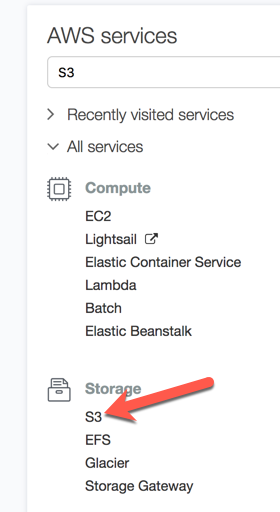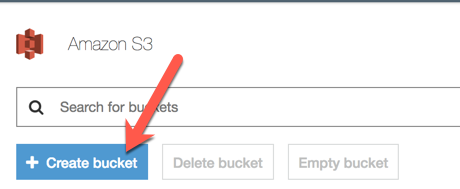AWS SAM project that allows invoking Jupyter notebooks dynamically using the AWS Lambda as the execution environment.
If running the API for the first time, or when requirements.txt file was updated, the following script should be executed first:
./scripts/link.sh
It will install and build all dependencies against the Amazon Linux and will place them in the build/code
directory.
Use SAM Local to run your Lambda function locally:
sam local start-api
The API will be running athttp://localhost:3000
To deploy this SAM project, an existing bucket is required in the target region. It can be created using AWS Management Console.
To create an S3 bucket, use the instructions below:
-
Sign-in to the AWS Management Console
-
Open the S3 Console by finding the corresponding icon in the "Storage" section or by typing "S3" in the service search field:
Once the bucket is created, it can be used for the SAM deployment. Use the "deploy.sh" script and provide all the required parameters:
./scripts/deploy.sh <Bucket-Name> <Stack-Name> <Region> <EnableCORS>
Bucket Name parameter should have the same value as the name of the bucket that was created in the previous step.
Stack Name can be any alphanumeric value without spaces. Using some name for the first time creates a new CloudFormation stack, while all consequent execution of the scrip with the same name will update the corresponding CF stack rather than create a new one.
Region must match the region of the bucket, created earlier.
EnableCORS is an optional parameter that can have Yes or No value depending on whether the CORS should be allowed for this endpoint.
Selecting one or multiple files will encode those files using Base64 encoding and contents will be uploaded to the working directory of the Jupyter Notebook.
The total size of all files should not exceed 3 MB in Base64 encoding.
Selecting a single file will also put it's contents to the corresponding text field for further preview.
To enable cross-origin requests (requests from domains, different from the API domain), a CORS support was implemented. CORS is enabled by default and can be configured using various parameters of the stack:
Parameters:
EnableCORS:
Type: String
Default: Yes
AllowedValues:
- Yes
- No
CORSDomain:
Type: String
Default: "*"
CORSMethods:
Type: String
Default: "DELETE,GET,HEAD,OPTIONS,PATCH,POST,PUT"
CORSHeaders:
Type: String
Default: "Content-Type, Authorization, X-Amz-Date, X-Api-Key, X-Amz-Security-Token"
Default values should work in most of the cases. EnableCORS parameter can be supplied via the command line, as it explained in the "Deployment" section of the readme.
Dynamic CORS configuration is achieved by populating response headers programmatically (see the main.py file).
Enabled/disabled state is being read from Lambda environment variables, with a default value of 'true' (note it's a string and not a boolean, since the value is passed as an environment variable):
cors_enabled = os.environ.get('ENABLE_CORS', 'false') == 'true'
In a case if CORS is enabled, a CORS preflight request/response is implemented:
...
elif event['httpMethod'] == 'OPTIONS' and cors_enabled:
response = {
"statusCode": 200,
"body": None,
"headers": {
'Content-Type': 'application/json',
}
}
populate_cors(response)
return response
...
And finally, the POST response is being populated with proper CORS headers if CORS is enabled:
...
end = timer()
duration = end - start
response = {
"statusCode": 200,
"body": json.dumps({"duration": duration,"ipynb": result, "result": exec_result}),
"headers": {
'Content-Type': 'application/json',
}
}
if cors_enabled:
populate_cors(response)
...


